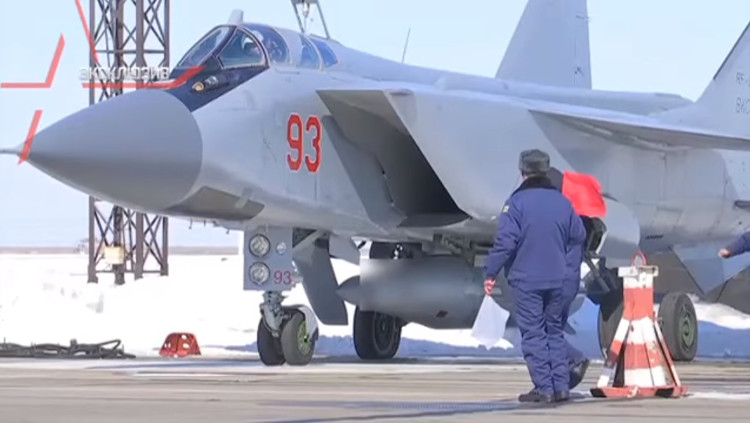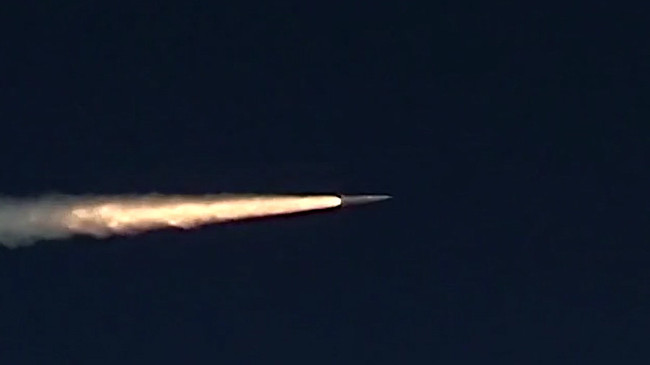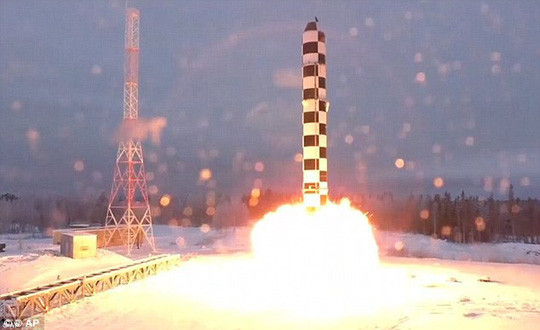Russia successfully tested missiles' unable to intercept
On March 11, Russia announced that it had successfully launched a supersonic missile carrying a nuclear warhead.
The Daily Mail reported that the Kinzhal (Dagger) missile flew at 12,391km / h over 2,000km and was launched from a MiG-31 supersonic interceptor that took off from a base in southwestern Russia. .
"The launch took place as planned and the supersonic rocket hit the target" - the defense ministry announced. The ministry also released a video showing two pilots preparing for the flight and running towards a fighter with a large rocket attached to the abdomen. The next scene shows the missile detached from the plane and rushes in the night.
Kinzhal missiles are one of the new weapons Putin revealed earlier this month before the presidential election took place on March 18. According to the Russian president, Kinzhal missiles have 10 times the speed of sound with unpredictable orbits and can pass air defense systems.

New missile mounted under the belly of the MiG-31.(Photo: Russian MO).

Kinzhal missiles are 10 times faster than sound.(Photo: Russian MO).
Specifically, Mr Putin said Russia had tested a new series of "impossible to be intercepted". They include a nuclear power cruise missile and an unmanned underwater nuclear power plane
In the speech, the Kremlin boss affirmed that the creation of new weapons made NATO's missile defense "useless" and put an end to efforts to prevent Russia's military development. West.
When referring to new weapons, Mr. Putin said the nuclear power cruise missiles tested in the fall of 2017 have an unlimited scope of operation, high speed and maneuverability to help it overcome any system. missile defense.

The Sarmat missile test took place in 2017. (Photo: AP).

Unmanned nuclear power aircraft under water.(Photo: EPA).
In addition, underwater drones also have a "transcontinental" range and the ability to carry nuclear warheads aimed at both carriers and coastal facilities. Russian President praised that with the depth of operation and the high speed of this aircraft, being intercepted by the enemy is impossible.
Mr. Putin demonstrated his statement with a series of videos and images of new weapons and declared: "No country in the world has such weapons. It could be born someday but by then we have developed a new weapon. "
- Russia first tested space missiles since Soviet times
- Russia successfully tested the dive equipment
- Russia launches intercontinental ballistic missiles
- China successfully tested the new supersonic rocket that made the US worried about it
- Vietnam successfully produced a mixed fuel ingot for missiles
- America failed to try to intercept missiles from aircraft
- Pakistan successfully tried stealth missiles
- Top 10 most terrifying intercontinental missiles in the world
- Russia successfully tested combat robots
- Russia successfully tested the first atmospheric satellite
- Russia successfully launched the European telecommunications satellite
- Russia launches new space missiles from its base in the country
 'Fine laughs' - Scary and painful torture in ancient times
'Fine laughs' - Scary and painful torture in ancient times The sequence of numbers 142857 of the Egyptian pyramids is known as the strangest number in the world - Why?
The sequence of numbers 142857 of the Egyptian pyramids is known as the strangest number in the world - Why? History of the iron
History of the iron What is alum?
What is alum? Did humanity just witness its first space battle?
Did humanity just witness its first space battle?  How does the Stinger missile work?
How does the Stinger missile work?  How do hypersonic missiles work?
How do hypersonic missiles work?  Close up of the missile journey from the launch pad, move and hit the target
Close up of the missile journey from the launch pad, move and hit the target  Which Israeli naval light guard ships are equipped with advanced weapons?
Which Israeli naval light guard ships are equipped with advanced weapons?  Discover the secret bases of the Soviet Union
Discover the secret bases of the Soviet Union 